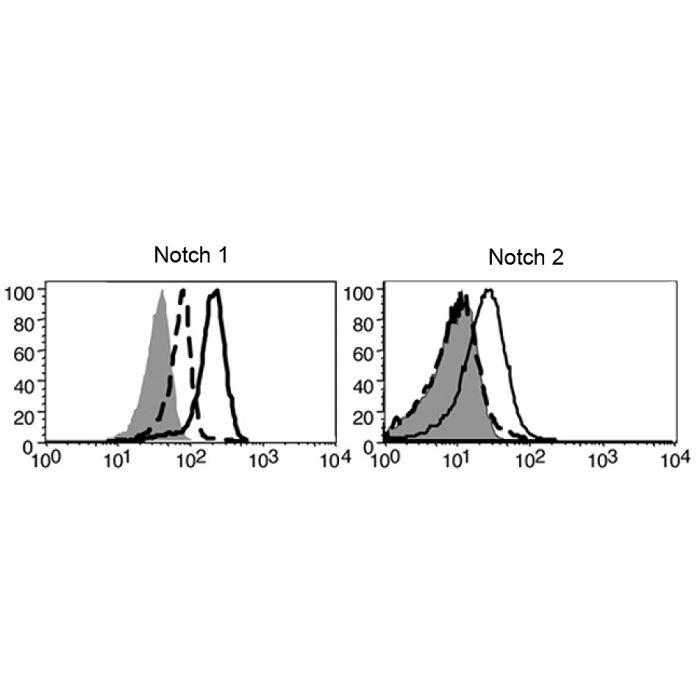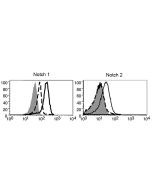Cookie Policy: This site uses cookies to improve your experience. You can find out more about our use of cookies in our Privacy Policy. By continuing to browse this site you agree to our use of cookies.
AdipoGen Life Sciences
anti-Notch2, mAb (16F11)
As low as
150
CHF
CHF 150.00
In stock
Only %1 left
AG-20B-0052-TRIAL25 µgCHF 150.00
AG-20B-0052-C100100 µgCHF 350.00

Figure 1: Detection of endogenous mouse Notch 1 or Notch 2 on resting and activated T cells with anti-Notch1 (mouse), mAb (22E5) (Prod. No. AG-20B-0051) and anti-Notch2, mAb (16F11) (Prod. No. AG-20B-0052), respectively. Method: CD4+ T cells from C57BL/6 mice were treated with anti-CD3 on plastic (solid line), IL-2 (dotted line) or medium alone as a negative control (shaded histogram) for 24h. The staining was revealed with a secondary anti-mouse IgG-PE (1/200) and then analyzed by flow cytometry.
| Product Details | |
|---|---|
| Synonyms | Neurogenic Locus Notch Homolog Protein 2; Motch B |
| Product Type | Monoclonal Antibody |
| Properties | |
| Clone | 16F11 |
| Isotype | Rat IgG1κ |
| Source/Host | Purified from concentrated hybridoma tissue culture supernatant. |
| Immunogen/Antigen | Recombinant mouse Notch2:Fc (AG-40B-0110). |
| Application |
Flow Cytometry: (1:500) |
| Crossreactivity |
Human Mouse |
| Specificity |
Recognizes human and mouse endogenous Notch2 receptor. |
| Purity | ≥95% (SDS-PAGE) |
| Purity Detail | Protein G-affinity purified. |
| Concentration | 1mg/ml |
| Formulation | Liquid. In PBS containing 10% glycerol and 0.02% sodium azide. |
| Isotype Negative Control | |
| Shipping and Handling | |
| Shipping | BLUE ICE |
| Short Term Storage | +4°C |
| Long Term Storage | -20°C |
| Handling Advice |
After opening, prepare aliquots and store at -20°C. Avoid freeze/thaw cycles. |
| Use/Stability | Stable for at least 1 year after receipt when stored at -20°C. |
| Documents | |
| MSDS |
 Download PDF Download PDF |
| Product Specification Sheet | |
| Datasheet |
 Download PDF Download PDF |
Description
Notch signaling pathway regulates many different cell fate decisions in both vertebrate and invertebrate species. There are 5 canonical Notch ligands in mammals: Jagged-1, Jagged-2, DLL1, DLL3 and DLL4. These can bind to the four Notch receptors Notch 1-4. It is important for pattern formation during development such as neurogenesis, angiogenesis or myogenesis and regulates T cell development and stem cell maintenance. Notch signaling is also involved in cellular processes through-out adulthood. Signaling via Notch occurs between neighbouring cells and both the receptor and its ligands are transmembrane proteins.
Product References
- Dynamic Regulation of Notch 1 and Notch 2 Surface Expression during T Cell Development and Activation Revealed by Novel Monoclonal Antibodies: E. Fiorini, et al.; J. Immunol.183, 7212 (2009)
- Cutting edge: Thymic NK cells develop independently from T cell precursors: V.S. Ribeiro, et al.; J. Immunol. 185, 4993 (2010)







